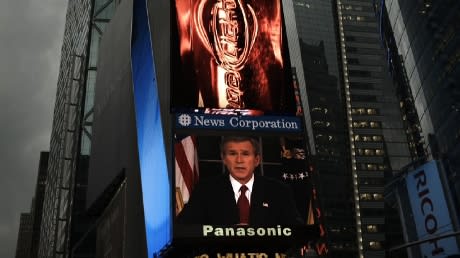It's redundant to point out that by definition, "liberty," whether individual or collective, isn't technically possible in a community of social beings. There are degrees of liberty, such as the supposed freedom of democracy versus a totalitarian rule or basic (modified) civil rights in regions free from rigid religious beliefs, but our societal experience tends to be guided, even if unconsciously, by the regurgitation and performance of the status quo for reward, acceptance and, as this documentary details, the means to power and control.
Jumping between a variety of thematically related but somewhat incongruent examples, Jean-Philippe Tremblay's talking head extravaganza, Shadows of Liberty, reiterates your standard high school social science lesson in pointing out that the media can be manipulated by a variety of signifiers and influences. He starts with the example of Nike exploiting Olympic coverage with CBS to bury their stories of Vietnamese slave labour, adding insult to injury by making news correspondents wear Nike symbols on their clothes during telecasts, and then moves through modifications to the FCC and corporate monopolization of media entities to limit the scope and voice of social discussion.
Some of the stories of injustice within this professionally made but somewhat bloated documentary do inspire curiosity and fury, such as the handling of the post-9/11 Iraqi invasion by major publications, but their relevance to the actual theme of commercializing and selling news as entertainment is limited to a very singular perspective. How sycophantic parroting by "yes men" journalists at The New York Times compares to NBC's sleazy decision to make news into sensationalist reality trash like To Catch a Predator is glossed over by the mere reiteration that "big companies are bad."
At the end of it all, we're left with a message about the importance of differing voices, suggesting that minimizing conglomerate influence will somehow make journalism into a profound and unbiased debate between mature, uninfluenced professionals. Only, for those of us that use the Internet, this message is almost laughable, since there freedom of speech has led only to the same existing blasé regurgitation of populist sanctimony and undiscerning idealism, only with inferior grammar and fewer facts.
The issue is more inherently human than politically defined, which goes back to the notion of liberty as an absolute possibility.
(DocFactory)Jumping between a variety of thematically related but somewhat incongruent examples, Jean-Philippe Tremblay's talking head extravaganza, Shadows of Liberty, reiterates your standard high school social science lesson in pointing out that the media can be manipulated by a variety of signifiers and influences. He starts with the example of Nike exploiting Olympic coverage with CBS to bury their stories of Vietnamese slave labour, adding insult to injury by making news correspondents wear Nike symbols on their clothes during telecasts, and then moves through modifications to the FCC and corporate monopolization of media entities to limit the scope and voice of social discussion.
Some of the stories of injustice within this professionally made but somewhat bloated documentary do inspire curiosity and fury, such as the handling of the post-9/11 Iraqi invasion by major publications, but their relevance to the actual theme of commercializing and selling news as entertainment is limited to a very singular perspective. How sycophantic parroting by "yes men" journalists at The New York Times compares to NBC's sleazy decision to make news into sensationalist reality trash like To Catch a Predator is glossed over by the mere reiteration that "big companies are bad."
At the end of it all, we're left with a message about the importance of differing voices, suggesting that minimizing conglomerate influence will somehow make journalism into a profound and unbiased debate between mature, uninfluenced professionals. Only, for those of us that use the Internet, this message is almost laughable, since there freedom of speech has led only to the same existing blasé regurgitation of populist sanctimony and undiscerning idealism, only with inferior grammar and fewer facts.
The issue is more inherently human than politically defined, which goes back to the notion of liberty as an absolute possibility.




